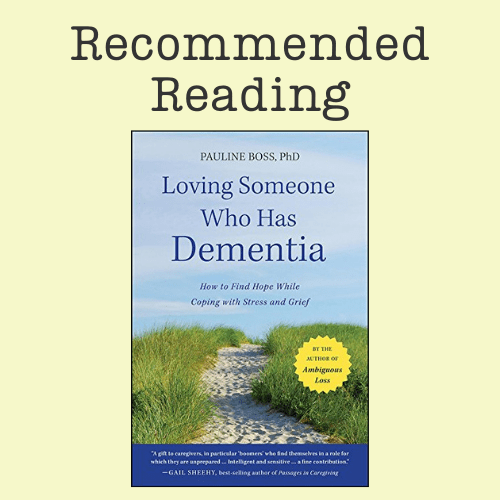Book Recommendation – Loving Someone Who Has Dementia by Pauline Boss
Monday March 14, 2022

Loving Someone Who Has Dementia: How to Find Hope While Coping with Stress and Grief by Pauline Boss, Ph.D. is our Recommended Resource for the month. You can check it out from our resource library for free (call 901-854-1200).
Working in the field of geriatrics (and specifically caring for individuals with dementia) I believe in the importance of education. The more you understand why things happen with your loved, the better you will be able to manage issues that come up.
If you want a book about the “Why’s” of dementia, this is not the book for you. Loving Somone Who Has Dementia is not about dementia itself but about you, the caregiver. It’s about coping with the daily stresses and grief caused by dementia. Dr. Boss focuses on how you can find hope throughout caregiving.
Does she dismiss the hard stuff, and make it seem like this is going to be a breeze? Absolutely not. As Dr. Boss explains, “[This book] is not about how to give day-to-day-hands-on-care; rather, it provides a new way to help you find meaning and hope in your relationship with someone you love who has dementia. The goal is to help you increase your resiliency – your ability to withstand and grown even stronger despite the stress and grief” (p. x). She continues “When we can’t control the dementia, we can still control how we perceive and manage the situation. And therein lies a caregiver’s window for hope” (p. xxi).
She explains that dementia affects not only the person living with it, but also anyone who cares for and about that person. She discusses the ambiguity of dementia and the ambiguity of losses. There isn’t a definite end or closure. Parts of your loved one are gone, and they are still present – at the same time. With dementia, there are competing truths. “I am both a caregiver AND a person with my own needs. I both wish it was over AND wish that my loved one keeps on living” (p. 14).
Dr. Boss talks multiple times about the need for caregivers to surround themselves with family and friends that can help. Caregivers need people who will listen without judgment. You need someone who will help do some of the hard work, as no one person can do this alone.
One thing that I really liked about this book is her emphasis on how terrible the stigma of dementia can be. She says “If your family or community stigmatizes dementia, reject this idea; it is born of ignorance. Dementia is not contagious, nor is it anyone’s fault” (p. 120). I couldn’t agree more!
A quote in the book that really stood out to me was:
“What we can do is live each day well, with more tranquility and peacefulness, recognizing that things will not always go our way. Bad things can indeed happen to good, smart, hardworking people” (p. 16).
This book was not a quick read for me. I would read some and then need to stop and digest. It’s written in a way that makes it easy to pick up and read a chapter here and there over time. There’s no need to rush through. I know that caregivers don’t get a lot of time to sit down and read. This is a good book to take your time.
If you are needing some hope while coping with the daily ins and outs of caregiving, this would be a great book for you to pick up.




